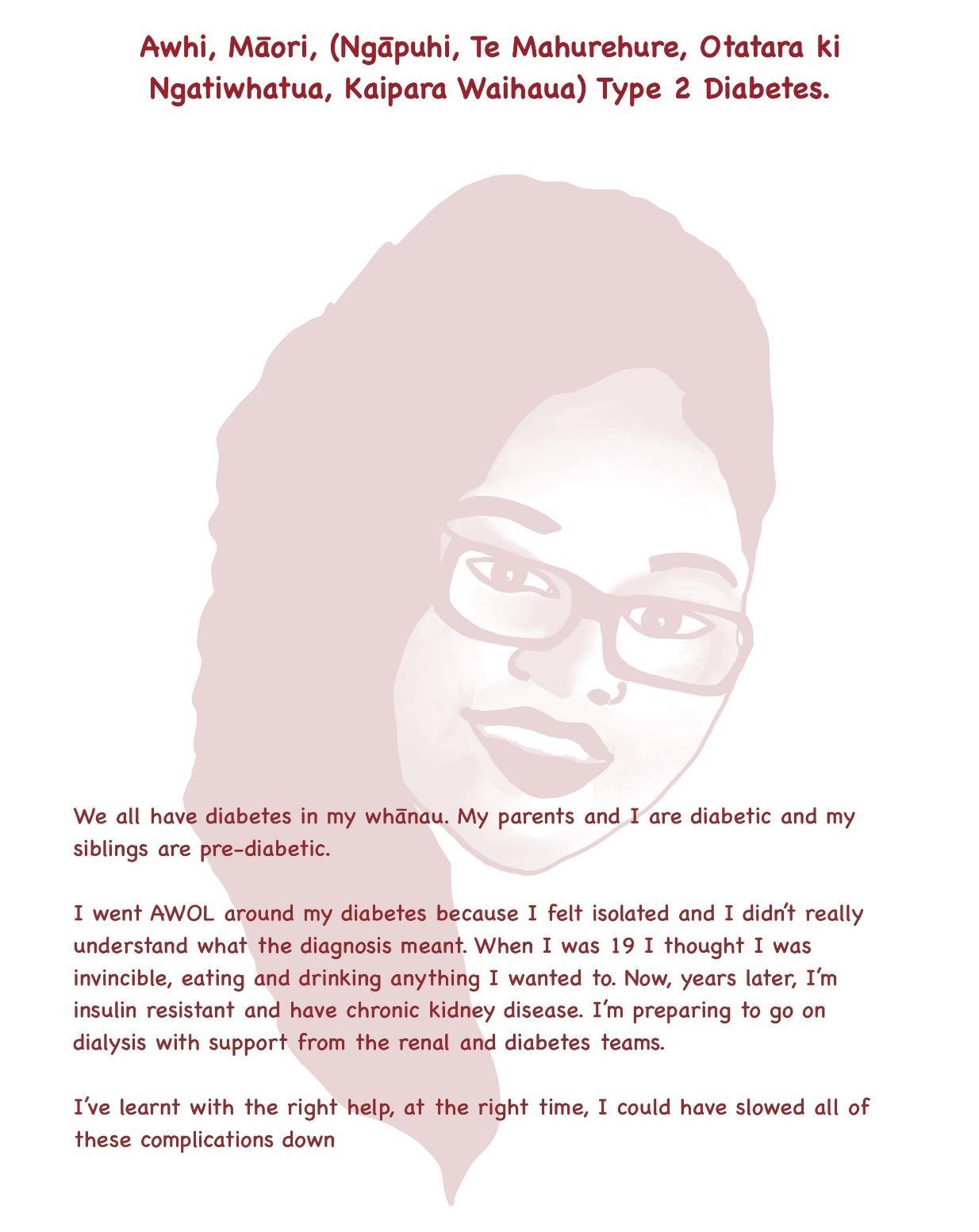
4 minute read
Whānau are supported to stay well
Focus area 2: Whānau have the information and support to help them reverse or manage their diabetes
Advertisement
The earlier type 2 diabetes, or pre-diabetes is diagnosed, the greater the chance of reversing the condition. We can maximise this opportunity through increased awareness of diabetes and improved access to screening, particularly among younger people. Women who have had gestational diabetes should also be regularly screened, given their increased risk of developing type 2 diabetes.
Early access to comprehensive self-management support can then enable whānau to stay well. Whānau will be supported to have the knowledge, skills, and confidence to effectively manage their health and wellbeing. After being diagnosed with diabetes or pre-diabetes, whānau will have easy access to diabetes-specific education and selfmanagement support. They will be supported to develop an individualised care plan and offered follow-up support to help maintain lifestyle changes.
This support will be delivered in a non-judgemental, whānau-centred manner, predominantly within communities. Community-led and supported wellbeing initiatives will also play an important role in supporting whānau to adopt and maintain healthy lifestyles. Our COVID-19 response has demonstrated the unique ability of Māori and Pacific providers to support community health and wellbeing, when mobilised and resourced to do so.
‘A family and community approach is key to all diabetes services. Collectively, not individualised, as Pacific peoples live, eat and rely on support of families, churches and community groups. It needs to create space to talanoa, explore and understand lived experiences and maintain their strong cultural backgrounds’ Soana Muimuiheata, Dietitian Consultant
Lifestyle changes can also be supported through better use of digital technology. Digital approaches need to be co-designed with communities, so they are user friendly, fit for purpose and achieve equitable outcomes. There are a number of promising digital initiatives in development, including Ol@-OR@, a mHealth tool, co-designed and evaluated in partnership with Māori and Pacific communities.5
5 Mhurchu et al. A co-designed mHealth programme to support healthy lifestyles in Māori and Pasifika peoples in New Zealand (OL@-OR@): a cluster-randomised controlled trial The Lancet Digital Health 2019
Whānau will be supported to manage their diabetes, regardless of how long they have had the disease. This means improving referral pathways to self-management support for all whānau, including those who have been hospitalised due to their diabetes.
Best-practice training and delivery resources informed by mātauranga Māori and Pacific knowledge will help improve the quality and consistency of diabetes education and self-management support.
What about type 1 diabetes?
Leading a healthy lifestyle and effective self-management is just as important for people with type 1 diabetes. This includes following a healthy diet, regular physical activity, taking appropriate amounts of insulin and self-monitoring blood glucose levels throughout the day. Effective self-management helps improve glycaemic control and reduce the risk of acute complications such as hypoglycaemia and long-term micro and macrovascular complications.
Self-management support should be delivered as part of a broader package of care, supported by the specialist health care team. Addressing the psychological impact of managing a long-term condition is an important aspect of this support.
Young people with type 1 diabetes require additional support as they transition from paediatric to adult diabetes care. This includes self-management support tailored to their needs, covering a range of issues including mental health, alcohol and drug use, and contraception. Adolescence can be a difficult time in any person’s life but coupled with a long-term condition it can be especially challenging. Access to an integrated multi-disciplinary team, which includes psychological support, is essential and has the potential to prevent longer-term complications.
Whānau are supported to stay well
Focus area 1: Whānau are supported to understand and reduce their risk of diabetes
We will strengthen existing mechanisms to identify and support whānau with or at risk of developing diabetes.
Key actions
• Increase awareness of the risk of diabetes among young people and women with gestational diabetes, within our priority groups. • Follow-up women with gestational diabetes at three months and annually thereafter. • Increase opportunistic screening for type 2 diabetes among at-risk children and young people, in line with the Australasian Guidelines6 • Strengthen the national Cardiovascular Disease Risk Assessment and management programme (CVDRA) through national roll-out of the CVDRA calculation tool, improved risk management and increased access through community outreach. • Support whānau to understand and reduce their risk of diabetes. This includes support to make lifestyle changes and awareness of the opportunity to reverse or delay the progression of diabetes.
Focus area 2: Whānau have the support, information, and resources to effectively manage their diabetes
Whānau will be able to access high-quality diabetes-specific education and lifestyle support at the time of diagnosis with ongoing support as needed. They will be able to choose the type of support they receive from a suite of available options, tailored to different communities and life stages.
Key actions
• Develop a central hub of self-management tools and resources for whānau with diabetes or pre-diabetes, including access to digital tools codesigned with priority groups. • Develop content guides, evaluation tools and professional development opportunities to support the delivery of high-quality diabetes-specific education and self-management support. • Deliver self-management support which meets the needs of priority groups. This means: more whānau-centred approaches co-designed with Māori and Pacific communities; more peer-led approaches and peer support networks; and increased support and resources for young people (with type 1 or type 2 diabetes), whānau with newly diagnosed diabetes, women with gestational diabetes, and young adults at high risk of developing serious complications. • Increase access to community-led and supported wellbeing initiatives for priority groups, to build health literacy and provide ongoing support.
6 Screening, assessment and management of Type 2 Diabetes in children and adolescents: Australasian Paediatric Endocrine Group guidelines, 2020. https://www.nzssd.org.nz/assets/table-files/resources73-resource_file.pdf



